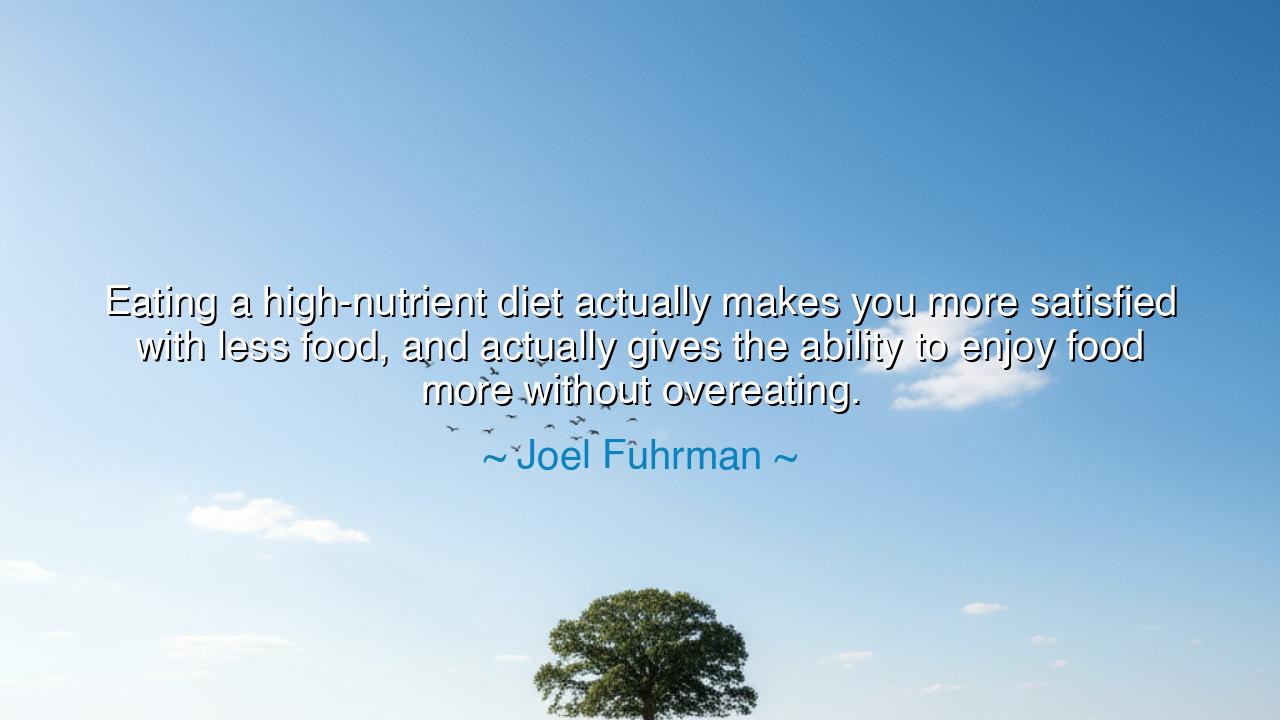
Eating a high-nutrient diet actually makes you more satisfied
Eating a high-nutrient diet actually makes you more satisfied with less food, and actually gives the ability to enjoy food more without overeating.






When Joel Fuhrman said, “Eating a high-nutrient diet actually makes you more satisfied with less food, and actually gives the ability to enjoy food more without overeating,” he spoke with the quiet power of a healer who has seen the human body both thrive and decay under the weight of its own desires. His words carry not only nutritional truth, but spiritual wisdom — for they touch the eternal struggle between excess and harmony, between greed and gratitude. What he reveals is not merely a principle of health, but a philosophy of fulfillment: that true satisfaction, whether of the body or the soul, comes not from consuming more, but from consuming better, from choosing what nourishes over what merely excites.
In Fuhrman’s teaching, the “high-nutrient diet” is more than a pattern of eating — it is a way of being. To eat with awareness, to fill one’s plate with foods rich in life — fruits, greens, grains, seeds — is to align oneself with nature’s original order. Such nourishment awakens the body’s wisdom, allowing hunger to serve its true purpose, not as a tyrant demanding constant pleasure, but as a guide leading us toward balance and vitality. When he says that eating this way “makes you more satisfied with less,” he speaks of a paradox as ancient as wisdom itself: that abundance is found not in excess, but in enough — that when the body receives what it truly needs, the craving for more fades like a shadow at sunrise.
The ancients knew this truth long before the age of processed foods and false abundance. The Greek physician Hippocrates, whom many call the father of medicine, taught that “food should be our medicine,” and that health arises from harmony between nourishment and need. He observed that when the body receives pure sustenance, disease retreats, and both appetite and emotion come into balance. The Eastern sages, too, from India to China, taught that overeating dulls the spirit, while mindful consumption sharpens awareness and peace. Thus, Fuhrman’s insight is not new, but a revival of the ancient covenant between man and nature — a reminder that health is not a discovery of modern science, but a rediscovery of timeless truth.
There is a story told of a Japanese monk who, while traveling through the mountains, shared his meal each day with a companion. The monk ate a handful of rice and a few vegetables, and yet he was radiant and strong. His companion, dissatisfied, mocked his restraint and demanded more food each day. Yet as the days passed, the monk’s energy grew while the other’s dulled. Finally, the monk said, “It is not the amount of food that nourishes, but the purity of what enters both mouth and mind.” So it is with Fuhrman’s words — he reminds us that what sustains us is not how much we take in, but how deeply we receive. To eat in this way is to honor both body and spirit — to make each meal a practice of awareness, gratitude, and balance.
In truth, Fuhrman’s wisdom goes beyond food; it speaks of all consumption. The modern world is starved not for calories, but for clarity. We fill ourselves with noise, speed, and stimulation, and yet feel perpetually empty. His teaching — that high-quality nourishment leads to deep satisfaction — mirrors a universal law: the quality of what we take in determines the quality of who we become. Just as the body thrives on wholesome food, so the soul thrives on truth, kindness, and mindfulness. When we replace shallow indulgence with genuine nourishment — in food, thought, and action — our hunger for more begins to quiet, and we rediscover peace.
To live by Fuhrman’s principle is therefore an act of liberation. It is to free oneself from the illusion of endless hunger, to see that more is not always better. It is to eat slowly, to savor fully, to choose foods that give life rather than steal it. In doing so, the act of eating transforms from a habit into a sacred ritual — a daily renewal of the bond between human and earth. Such eating brings not only physical health but emotional stability, mental clarity, and spiritual contentment. It reconnects us with the rhythm of creation itself, where nothing is wasted and everything has purpose.
So, my listener, remember this truth: to nourish wisely is to live wisely. Seek not fullness of the stomach, but fulfillment of the body and spirit. Choose foods that grow from sunlight and soil, that carry the pulse of life, not the residue of machines. Eat until you are satisfied, not stuffed; until you are energized, not dulled. Let each meal remind you that the goal is not indulgence, but harmony.
For as Joel Fuhrman teaches — and as the sages of old have always known — real satisfaction comes not from abundance, but from alignment. When what you eat serves your health, your heart, and your higher self, every bite becomes a blessing. And in that state, you will find that life itself tastes richer, even when you consume less — for true pleasure, like true wisdom, begins not in excess, but in understanding.






AAdministratorAdministrator
Welcome, honored guests. Please leave a comment, we will respond soon